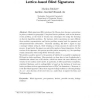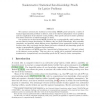PKC
2012
Springer
11 years 6 months ago
2012
Springer
We initiate the study of security for key-dependent messages (KDM), sometimes also known as “circular” or “clique” security, in the setting of identity-based encryption (I...
IACR
2011
12 years 4 months ago
2011
We give direct constructions of pseudorandom function (PRF) families based on conjectured hard lattice problems and learning problems. Our constructions are asymptotically effici...
ASIACRYPT
2011
Springer
12 years 4 months ago
2011
Springer
A cryptographic assumption is the (unproven) mathematical statement that a certain computational problem (e.g. factoring integers) is computationally hard. The leakage-resilience l...
ASIACRYPT
2010
Springer
13 years 2 months ago
2010
Springer
Blind signatures (BS), introduced by Chaum, have become a cornerstone in privacy-oriented cryptography. Using hard lattice problems, such as the shortest vector problem, as the bas...
CRYPTO
2008
Springer
13 years 6 months ago
2008
Springer
We construct noninteractive statistical zero-knowledge (NISZK) proof systems for a variety of standard approximation problems on lattices, such as the shortest independent vectors...
ASIACRYPT
2008
Springer
13 years 6 months ago
2008
Springer
In this paper, we show that two variants of Stern's identification scheme [IEEE Transaction on Information Theory '96] are provably secure against concurrent attack unde...
FOCS
2004
IEEE
13 years 8 months ago
2004
IEEE
We show that finding small solutions to random modular linear equations is at least as hard as approximating several lattice problems in the worst case within a factor almost line...
PKC
2007
Springer
13 years 10 months ago
2007
Springer
Abstract. We propose multi-bit versions of several single-bit cryptosystems based on lattice problems, the error-free version of the Ajtai-Dwork cryptosystem by Goldreich, Goldwass...



